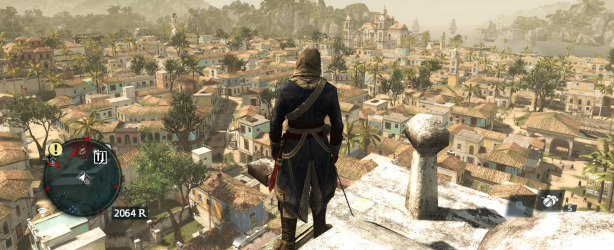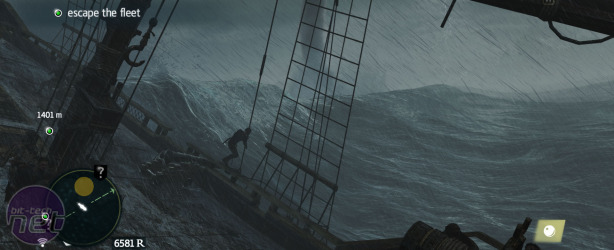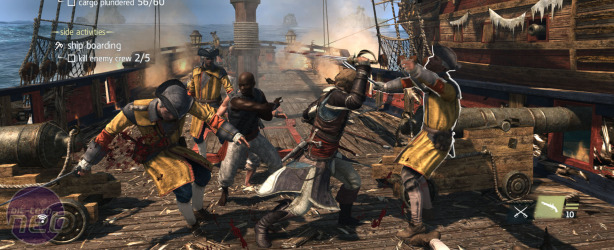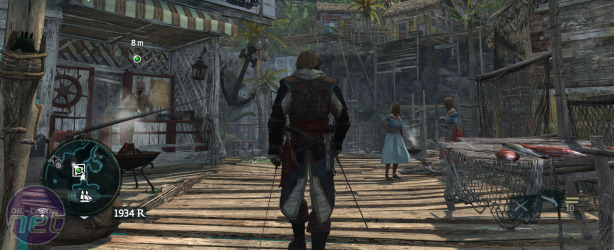
Developer: Ubisoft Montreal
Publisher: Ubisoft
Platforms: PC (reviewed), X360, PS3, PS4, Xbox One
Price: £39.99
Last year's Assassin's Creed III was a bloated, self-important mess that not only failed to evolve the series in a meaningful way, but also didn't rectify any of the issues which have nagged at the franchise pretty much since its inception. Specifically, these are an unpredictable climbing system, finicky counter-based combat, no proper stealth mechanic, and a ridiculous meta-story that ought to be retroactively edited out of the spacetime continuum.
Now Ubisoft have released a fourth game, so does it manage to fix any of these problems?
Nope. Instead it put a tri-corner hat on your head, a parrot on your shoulder, a boat under your feet and says "Go and be a pirate!" Rather than fix these issues, it tries to distract you from them, and succeeds brilliantly.
In fairness, there's a little more to it than that. Although Ubisoft Montreal haven't sorted any of the general Assassin's Creed idiosyncrasies, they have resolved the major pitfalls of the previous game, namely a lead character with all the personality of a box of Cornflakes (original, not Crunchy Nut), and a beautifully crafted open world that didn't really give much reason for the player to explore it beyond going "Look, a deer! Isn't that nice?"
Black Flag puts you in the salt-crusted boots of Edward Kenway, who is chronologically the grandfather of the previous game's protagonist Connor. So it's effectively a prequel, although the present-day meta-narrative continues on in sequential fashion, but we'll ignore the meta-narrative until we get to negatives. It's immediately clear that Connor's grandmother must have been a broom handle with a face painted on it, because he didn't inherit many of his grandfather's genes.
Kenway is a typical eighteenth-century rover. Selfish, avaricious, Welsh. He isn't even supposed to be an Assassin, instead becoming embroiled in the Templar/Assassin conflict by killing another Assassin and stealing his robes after a failed attempt to plunder the ship the Assassin happens to be travelling on. For the most part he has little time for either organisation, and is mostly focussed on making as much money as possible for himself, while occasionally helping out other pirates build a free Republic on Nassau.
As characters go he's arguably better than Ezio. Although Kenway is initially less likeable than your friendly neighbourhood Renaissance hitman, Ezio quickly shed his roguish skin to become the avenging angel the Assassins needed. Kenway's persistent scepticism and outright rebelliousness is so refreshing after six years of being forced to sup Ubisoft's adolescent "Assassins murder for freedom while Templars murder for control!" mumbo-jumbo. Kenway doesn't give a dolphin's arse. He just wants to blow up ships and make money, and he isn't going to let a conspiracy tracing back over a thousand years get in the way of that.
Another reason Kenway's character works so well is because it makes perfect sense given the world he inhabits. Black Flag is the most open and free of all the AC games so far, with a substantial chunk of the Caribbean available to explore. It encompasses the area surrounding Cuba, including two relatively small but meticulously crafted cities, Havana and Cuba, alongside fifty or so other locations to visit and upwards of a dozen different activities to participate in. More important, however, is how it encourages you to experiment and play within this world.
Part of this is down to the game's sailing aspect, adapted and expanded from that one mission in AC III. Sailing around the Caribbean is a delight in itself. The Jackdaw handles about as realistically as a rocking horse does compared to a real one, but the important thing is it feels authentic. The way the ship's bow dips into and rises over the vast swells of the game's beautifully rendered oceans, spraying seawater onto the deck and over your crew, who cheerfully sing sea shanties as they work. The sense of weight and bulk as you haul on the helm to turn the ship into a firing position, and unleash a deafening volley of cannon fire into the hull of a hulking Spanish Frigate. The awe-inspiring sensation of piloting the ship during a storm as the rain lashes down, and huge rogue waves and towering waterspouts threaten to turn the Jackdaw into toothpicks. Sailing is such a surprising, compulsive pleasure that in thirty hours of gaming we've used the fast-travel ability twice.
The ship is also important in the effect it has on the game's economy. See, the Jackdaw is only a Brig, the lowest class of the larger ships, and so needs to be upgraded in order to take down Frigates and Galleons and safely sail through the southern part of the map. But upgrading the Jackdaw is expensive, and requires certain materials that simply cannot be bought. The only way to do this is to plunder other ships for the requisite materials and sellable goods, and complete many types of side-missions in order to earn money.
Publisher: Ubisoft
Platforms: PC (reviewed), X360, PS3, PS4, Xbox One
Price: £39.99
Last year's Assassin's Creed III was a bloated, self-important mess that not only failed to evolve the series in a meaningful way, but also didn't rectify any of the issues which have nagged at the franchise pretty much since its inception. Specifically, these are an unpredictable climbing system, finicky counter-based combat, no proper stealth mechanic, and a ridiculous meta-story that ought to be retroactively edited out of the spacetime continuum.
Now Ubisoft have released a fourth game, so does it manage to fix any of these problems?
Nope. Instead it put a tri-corner hat on your head, a parrot on your shoulder, a boat under your feet and says "Go and be a pirate!" Rather than fix these issues, it tries to distract you from them, and succeeds brilliantly.
In fairness, there's a little more to it than that. Although Ubisoft Montreal haven't sorted any of the general Assassin's Creed idiosyncrasies, they have resolved the major pitfalls of the previous game, namely a lead character with all the personality of a box of Cornflakes (original, not Crunchy Nut), and a beautifully crafted open world that didn't really give much reason for the player to explore it beyond going "Look, a deer! Isn't that nice?"
Black Flag puts you in the salt-crusted boots of Edward Kenway, who is chronologically the grandfather of the previous game's protagonist Connor. So it's effectively a prequel, although the present-day meta-narrative continues on in sequential fashion, but we'll ignore the meta-narrative until we get to negatives. It's immediately clear that Connor's grandmother must have been a broom handle with a face painted on it, because he didn't inherit many of his grandfather's genes.
Kenway is a typical eighteenth-century rover. Selfish, avaricious, Welsh. He isn't even supposed to be an Assassin, instead becoming embroiled in the Templar/Assassin conflict by killing another Assassin and stealing his robes after a failed attempt to plunder the ship the Assassin happens to be travelling on. For the most part he has little time for either organisation, and is mostly focussed on making as much money as possible for himself, while occasionally helping out other pirates build a free Republic on Nassau.
As characters go he's arguably better than Ezio. Although Kenway is initially less likeable than your friendly neighbourhood Renaissance hitman, Ezio quickly shed his roguish skin to become the avenging angel the Assassins needed. Kenway's persistent scepticism and outright rebelliousness is so refreshing after six years of being forced to sup Ubisoft's adolescent "Assassins murder for freedom while Templars murder for control!" mumbo-jumbo. Kenway doesn't give a dolphin's arse. He just wants to blow up ships and make money, and he isn't going to let a conspiracy tracing back over a thousand years get in the way of that.
Another reason Kenway's character works so well is because it makes perfect sense given the world he inhabits. Black Flag is the most open and free of all the AC games so far, with a substantial chunk of the Caribbean available to explore. It encompasses the area surrounding Cuba, including two relatively small but meticulously crafted cities, Havana and Cuba, alongside fifty or so other locations to visit and upwards of a dozen different activities to participate in. More important, however, is how it encourages you to experiment and play within this world.
Part of this is down to the game's sailing aspect, adapted and expanded from that one mission in AC III. Sailing around the Caribbean is a delight in itself. The Jackdaw handles about as realistically as a rocking horse does compared to a real one, but the important thing is it feels authentic. The way the ship's bow dips into and rises over the vast swells of the game's beautifully rendered oceans, spraying seawater onto the deck and over your crew, who cheerfully sing sea shanties as they work. The sense of weight and bulk as you haul on the helm to turn the ship into a firing position, and unleash a deafening volley of cannon fire into the hull of a hulking Spanish Frigate. The awe-inspiring sensation of piloting the ship during a storm as the rain lashes down, and huge rogue waves and towering waterspouts threaten to turn the Jackdaw into toothpicks. Sailing is such a surprising, compulsive pleasure that in thirty hours of gaming we've used the fast-travel ability twice.
The ship is also important in the effect it has on the game's economy. See, the Jackdaw is only a Brig, the lowest class of the larger ships, and so needs to be upgraded in order to take down Frigates and Galleons and safely sail through the southern part of the map. But upgrading the Jackdaw is expensive, and requires certain materials that simply cannot be bought. The only way to do this is to plunder other ships for the requisite materials and sellable goods, and complete many types of side-missions in order to earn money.

MSI MPG Velox 100R Chassis Review
October 14 2021 | 15:04












Want to comment? Please log in.